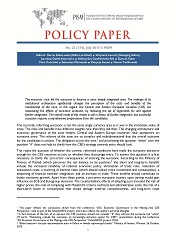№032: The Implications of Hungary’s National Policy for Relations with Neighbouring States
№032: The Implications of Hungary’s National Policy for Relations with Neighbouring States
Author(s): Anita Sobják
Subject(s): Economic policy, International relations/trade, Geopolitics
Published by: PISM Polski Instytut Spraw Międzynarodowych
Keywords: Hungary; Central Europe; domestic policy; Europe; foreign policy
Summary/Abstract: The paper highlights the importance of Hungary’s policy towards the Hungarian diaspora in the countries of Central and South-Eastern Europe. The author points to both discontinuities and similarities in the approach of post-Cold War Hungarian governments and political elites to the issue of so-called national policy, as well as its interplay with other strategic directions of Hungary’s foreign policy in this period, most notably Euro-Atlantic integration and good-neighbourly relations. The analysis focuses on the national policy as implemented by the current Hungarian government of the FIDESZ political party. The policy itself is rooted in the Hungarian legislation, and is reflected in the structures of the Hungarian administration. As such, its implementation has not been without considerable negative repercussions for Hungary’s relations with its neighbours but, as the author points out, in some cases the relationship remained amicable, or at least cooperative.
Series: PISM Policy Papers
- Page Count: 9
- Publication Year: 2012
- Language: English
- Content File-PDF

